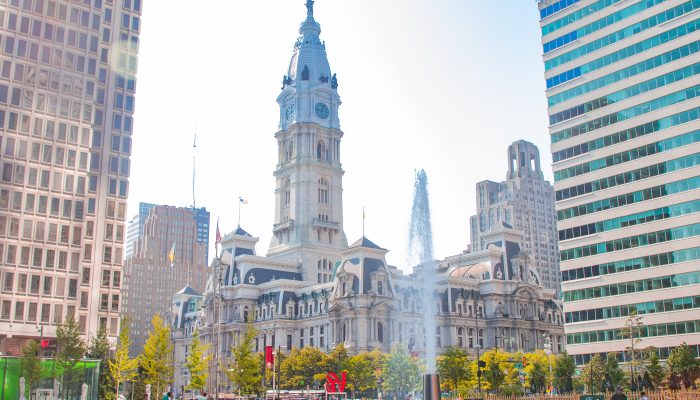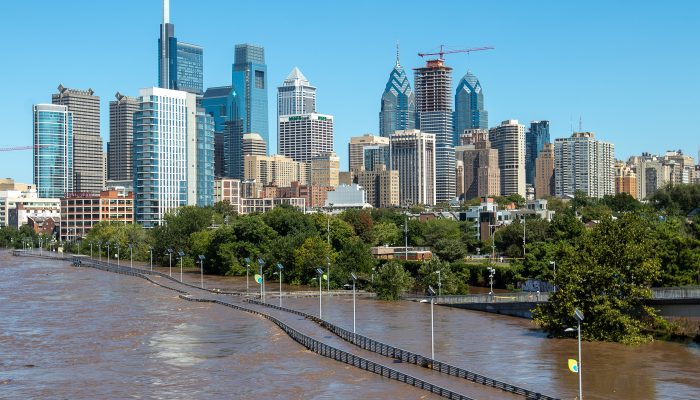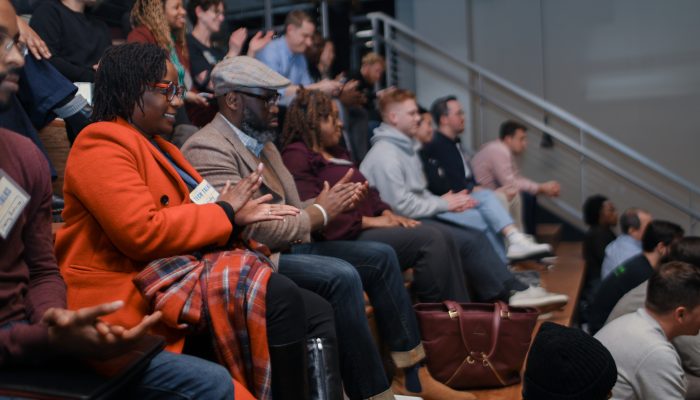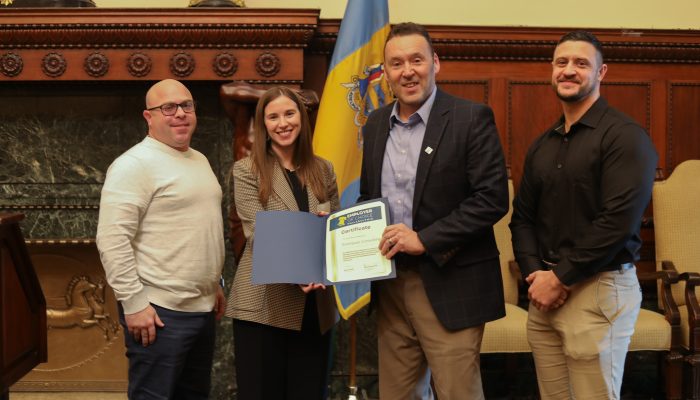March 10, 2022 marks two years since Philadelphia confirmed its first case of COVID-19. While many of us thought the pandemic might last two weeks or a couple of months, we soon realized that we could no longer hope to get “back to normal” and would need to find a way to navigate this new reality together.
Throughout the pandemic, City of Philadelphia employees have worked hard to meet the new and changing needs of residents. Here’s a look back on a few of the ways we’ve continued to respond to COVID-19 while also beginning to open our city back up and return to doing the things we love.
We got vaccinated
Over the last 14 months—since the vaccines started rolling out—Philadelphia has become one of the most vaccinated cities in the country. This is thanks to the Department of Public Health’s tireless efforts and our incredible healthcare partners.
As of March 8, 2022, more than 76 percent of Philadelphia adults are now fully vaccinated, and 93 percent of residents 12 and older have received at least 1 dose.
https://twitter.com/PhillyMayor/status/1420813691554078723?s=20&t=V4n05wZCutEByB_4LmnEVg
We worked together to #VaxUpPhilly
Getting our residents vaccinated was a cross-departmental effort for the City. While the Philadelphia Department of Public Health led our efforts, many other City departments came together to help reach residents.
- The Philadelphia Fire Department hosted vaccination clinics at a range of sites across the city and made house calls to homebound residents.
- Philadelphia Parks & Recreation hosted vaccination clinics at some older adult centers and recreation centers.
- The Office of Homeless Services along with the Department of Behavioral Health and Intellectual disAbility Services focused efforts on reaching and engaging people experiencing homelessness to give them easy access to the COVID-19 vaccine.
- PhillyCounts knocked on more than 70,000 doors, engaged more than 42,000 residents in conversations about getting vaccinated, made 216,178 phone calls, and trained over 1,000 Vaccine Information Champions. Also, PhillyCounts has supported the Philanthropy Network of Greater Philadelphia’s COVID-19 Recovery and Response fund’s 36 neighborhood ambassadors and 133 local grantee organizations.
- The Philadelphia Department of Public Health held hundreds of pop-up community clinics throughout the city and funded 9 organizations to hold their own community vaccine clinics. They also launched an ongoing vaccine incentive initiative where Philadelphians who complete their COVID-19 vaccine series at a participating Health Department vaccine clinic will get $100!
We continued our emergency response and coordination
Philadelphia’s Emergency Operations Center (EOC), operated by the Office of Emergency Management (OEM), was activated on March 11, 2020 to coordinate the multi-department and agency response to COVID-19.
To this day, the EOC remains active as OEM staff continues to support the city’s pandemic actions. In 2021, OEM and the EOC:
- Established two centers, operated by the City and supported by FEMA, to provide large-scale vaccination capabilities to the city’s highest-risk and most vulnerable populations and delivered more than 350,000 vaccinations.
- Supported over 530 vaccination clinics throughout the city.
- Partnered with SEPTA, Indego bike share, and United Way to help transport Philadelphians to and from their vaccine appointments. Over 2,250 door-to-door rides were provided by Septa CCT. More than 55,000 transit passes were distributed to over 25,000 people at community vaccination clinics.
- Assisted in pediatric vaccinations for children ages 5-11 and facilitated and delivered 24,000 rapid test kits to clinics.
Today, we activated the city’s Emergency Operations Center in response to COVID-19. The EOC brings city departments and external partners together in one room to set objectives, facilitate real-time decision making, and form response under a common operating picture. #COVIDPHL pic.twitter.com/yUnoS1tX2u
— Philadelphia OEM (@PhilaOEM) March 11, 2020
We supported businesses and workers
Over the past two years, despite the pandemic’s enormous impact on the City’s budget, we stepped up to support our residents and businesses.
Since March 2020, more than $140 million in government, philanthropic, and private funding has been directed to our small businesses and nonprofits—including four grant programs stood up by our Department of Commerce, PIDC, and the Commonwealth. Those funds have been lifelines for thousands of local businesses.
Our Worker Relief Fund also provided more than $2.2 million in emergency cash assistance to over 2,800 workers left out of federal and state relief programs.
We launched PHLRentAssist to help even more people stay in their homes
The City and PHDC launched four phases of the PHLRentAssist Program. The program helped people who have experienced financial hardship because of COVID-19 pay their rent. Phase 4 also included utilities assistance.
Since May 2020, the City has helped nearly 40,000 households, disbursing more than $253 million to support families and individuals affected by COVID-19. The program’s dashboard details spending and will continue to be updated on a regular basis.
We helped vulnerable populations
Philadelphians reentering from the jails during COVID-19
In March 2021 we launched the COVID Reentry Payment Program. A total of nearly 1,200 payments were distributed to eligible Philadelphia residents. In addition to the payments of $500, individuals were connected to resources that included supportive housing, employment, family reunification, and other benefits.
Foster youth
Nearly 1,700 current and former foster youth received Pandemic Cash Assistance, coordinated by the Philadelphia Department of Human Services. The program provides a one-time cash payment of $800 to eligible applicants.
Unsheltered populations
Over the past nearly two years, the City has sheltered over 19,000 people and continuously adapted homeless services and outreach to the challenges and risks posed by the pandemic. Through the Homeless Outreach Program, the Department of Public Health held over 100 vaccine clinics, administering 1,834 total doses in 2021.
City-supported shelters never closed during the pandemic. To support Philadelphians with COVID-19 who could not isolate safely – including people in congregate shelters – the City of Philadelphia operated an isolation and quarantine (I&Q) facility, offering residents a safe and comfortable room in a Center City hotel. The Office of Homeless Services also established five non-congregate sites to serve as COVID-19 Prevention Spaces for older adults and people with chronic underlying health conditions. The sites provided furnished private rooms, meals, and transportation. Although this model was adopted in many cities, Philadelphia’s model is unique because the goal of exiting to safe, permanent, affordable housing was built into the program from the start. More than 228 people have moved into permanent housing so far.
We kept water flowing
The Philadelphia Water Department restored water to thousands of customers at the start of the pandemic and quickly enacted an unprecedented freeze on shutoffs for nonpayment. That freeze will remain in place for residents through June 30, 2022, making Philadelphia’s water assistance efforts among the most progressive of any U.S. city.
The department also strengthened assistance by introducing debt forgiveness options for enrolled customers, expanding payment agreement plans with more generous terms, increasing program advertising through a variety of print and digital platforms, and offering outreach with events like the ongoing Utility Fairs, which take place through March 30.
We celebrated our Vaxx-aversary
On December 15, 2021 we celebrated the one-year anniversary of the first COVID-19 vaccine being administered in Philadelphia. We asked residents to share their photos and stories about when and why they got vaccinated.
We made sure students and their families had access to reliable internet
While the City has been working on bridging the digital divide, the pandemic created an urgent need to help students get internet access for online learning. In response, the City worked with a number of partners to launch PHLConnectED—a program that provides free and reliable internet access to pre-K–12 students in need.
Since its launch in August 2020, PHLConnectED has enabled over 21,000 internet connections for pre-K–12 households in Philadelphia and is working to provide digital skills support for caregivers.
In February 2022, the City also unveiled the Digital Equity Plan, which aims to help Philadelphia reach a baseline of digital equity over the next five years.
We helped Philadelphians access free food and meals
In March 2020 the City immediately mobilized an emergency food response that included many ways for families to receive free, nutritious food in partnership with community organizations and schools. The City activated a food warehouse to distribute food to 40 neighborhood sites through our partnership with Philabundance and Share Food Program. Also, the City promoted specialized distribution to vulnerable populations—students, older adults, people with disabilities, and unsheltered individuals in partnership with the School District of Philadelphia, Philadelphia Corporation for the Aging, Liberty Resource Connects and the Step Up to the Plate (Broad St. Ministry, Prevention Point, SEAMAAC).
These efforts resulted in the distribution of over 23 million meals and over 41 million pounds of food. Two years later, the City continues to help residents find free food with the phila.gov/food finder.
We welcomed Afghan evacuees
The City of Philadelphia and Philadelphia International Airport (PHL) coordinated with the federal government’s Operation Allies Welcome to provide a point-of-entry location for people evacuated from Afghanistan. Through our local Operation Allies Welcome PHL efforts, the City of Philadelphia provided medical assistance, housing, and connection to our diverse community of immigrant service providers who can assist with an array of social services.
There was also an outpouring of support and offers to help from Philadelphians across our city. Since August 2021, we’ve welcomed 29,713 Afghan evacuees who made the journey to the United States.
This week, we are counting down the days to 2022 by highlighting some of the top stories around #PHLairport in 2021. Today we take a look back at #OperationAlliesWelcomePHL, which has welcomed over 29,000 Afghan evacuees thru PHL. pic.twitter.com/yNLpoStA0A
— PHLAirport (@PHLAirport) December 29, 2021
We continued to focus on City programs that will benefit Philadelphians for generations to come
Rebuild
Through Rebuild—made possible because of the Philadelphia Beverage Tax—we’re committing more than $400 million to improve our parks, recreation centers, playgrounds, and libraries.
Rebuild has cut the ribbon on 9 projects, with another 11 preparing for or in construction, and 40 sites have started community engagement and design.
Rebuild also represents one of the City’s most intentional efforts to invest in minority-owned businesses—ever. More than 66 percent of Rebuild’s committed contract dollars are going to minority or women-owned businesses—far higher than even the City’s own ambitious Citywide goal of 35 percent of spending for minority businesses.
Street sweeping
In summer 2021, we relaunched our street sweeping pilot in six neighborhoods across the city, with plans to extend to 14 neighborhoods later this spring. It is supplemented by the sidewalk sweeping on our commercial corridors through the City’s corridor cleaning program—PHL Taking Care of Business.
PHLpreK
Since its start in 2017, PHLpreK has served over 10,000 students. In 2021, the free, quality pre-K program expanded by 700 slots to offer 4,000 opportunities for children at more than 150 locations throughout the city! PHLpreK—funded by the Philadelphia Beverage Tax—is available to 3 and 4-year-old children who reside in the City of Philadelphia.
Pools
Most pools reopened for the 2021 summer season and will open again for summer 2022. Help us reopen pools this summer and sign up to become a lifeguard.
Splish, splash, pools are back! 🏊🏽♂️ Find a pool open near you! ➡️ https://t.co/i2iT2EWUdf pic.twitter.com/QAaJXSy3Ei
— Philadelphia Parks & Recreation (@PhilaParkandRec) July 1, 2021
The return of in-person special events
Although 2021 was a tough year for many, we want to acknowledge that there were countless positive things that happened too, including the return of parades, holiday celebrations, the Broad Street Run, the Philadelphia Marathon, and much more.
Moving forward
On March 2, 2022 the Philadelphia Department of Public Health announced that Philadelphia’s COVID-19 metrics have dropped enough that the Health Department moved the city into the All Clear COVID Response Level and will no longer enforce an indoor mask mandate and other COVID-19-related restrictions.
It’s important to remember that the pandemic is not over and we may need to move to start enforcing COVID-19 public mandates again, but moving to All Clear is still great news for Philadelphia.
It’s taken all of us working together to get to this point. Thank you, Philadelphia.




